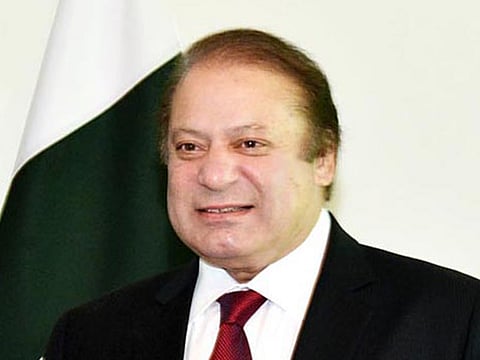Pakistan’s continuing challenge
Any number of promises to reform the country will remain in doubt unless the Pakistani public begins to feel that a long overdue clean-up to tackle corruption is truly underway

As Pakistan’s Prime Minister Nawaz Sharif fights back against mounting attacks from political foes, who want him to come clean following recent revelations of large-scale overseas wealth belonging to his children, a much wider issue than simply the future of the Pakistani leader is at stake.
The attacks were triggered following revelations of three of Sharif’s four children having maintained offshore assets, discovered recently and widely known as the ‘Panama leaks’.
That Sharif’s children had stashed away billions of rupees offshore should not come as a surprise to anyone familiar with the lives of Pakistan’s elite. Pakistan’s rich and famous have historically built assets outside the country, often as an insurance policy for those rainy days when they may be forced into exile.
The issue at hand is significantly more about exactly how Sharif’s children built up their financial empire, which allowed them to eventually buy lavishly-priced real estate in central London.
If indeed the assets were built from a legitimate business activity, where the returns were taxed under Pakistan’s law before the funds were sent abroad, the matter will be amicably settled. But in a country where corruption is widespread, the prime minister’s words are just not enough to satisfy his critics.
Though Sharif has said publicly of his two sons having built their assets from the sale of the family’s steel business in Saudi Arabia, his words have yet to be matched with solid evidence. Moreover, questions continue to linger over the source of the wealth of Maryam, Sharif’s daughter, also named as one of the beneficiaries of the Panama-registered companies.
The outcome of these pertinent questions will indeed be vital for the future of Pakistan in at least two inter-connected ways. On the one hand, the final outcome will decide if indeed Sharif himself had done wrong or not — an outcome that could seal his political fate. So far, leaders of his Pakistan Muslim League-Nawaz (PML-N) party have defended Sharif by arguing that the prime minister remains above reproach in the matter at hand, given that none of the offshore assets were in his name.
On the other hand, ordinary Pakistanis appear to be generally tired of their leaders, many of whom remain linked to corrupt activities. It is important for the Pakistani public to finally go through a long overdue uplifting of morale, which can only take place if there is evidence of the rich and mighty being taken to task.
In the meantime, the battle against corruption must also witness a long overdue campaign to clean up grass-roots institutions dealing with graft-related matters, such as the police and the structure of lower courts. This is vital to ensure that ordinary Pakistanis begin to see a difference in their daily lives.
Today, many of those who are caught dealing with challenges that take them to the police and/or the lowest tiers of the judiciary, find themselves caught between a rock and a hard place. In a large number of cases, those at the receiving end usually must reconcile with the harsh reality of being forced to bribe public officials, only to protect their rights.
In the wake of the ‘Panama leaks’, Sharif has offered to set up a new commission to probe the matter. Aside from disagreement on the terms of reference, a central question over the impartiality of the commission will continue to haunt the prime minister till he remains in office. For his critics, Sharif’s continuation as the premier will also undermine the commission.
The Pakistani public’s mounting concern over corruption was highlighted recently, when a non-governmental organisation in Pakistan reported that 64 per cent of the respondents to a survey believed that corruption prevails in government departments. Given anecdotal evidence over the incidence of corruption, Pakistanis by and large appear to feel that they are forced to bribe public officials at one point or the other during their life time.
A credible push to reform Pakistani society must therefore be launched aggressively to tackle this matter. Any number of promises to reform Pakistan will remain in doubt unless the Pakistani public begins to feel that a long overdue clean-up to tackle corruption is now well underway.
Towards that end, a turnaround must start from the top tiers of politics, government and other segments of the elite. For Sharif, the moment of reckoning has come. Rather than wait for the commission that he has announced, Pakistan’s prime minister needs to act in good faith and publicly reveal the sources of the overseas wealth belonging to him and his immediate family members.
If he is convinced that the overseas wealth has credible sources, Sharif should not have anything to fear. But if he resists the pressures and chooses to pay only lip service to this vital cause, it will then be obligatory for the leaders of his party to take him to task. A failure will only prove the paucity of a democratic character in Pakistan’s emerging democratic fabric.
Ultimately, Pakistanis on the streets will not only continue to be exposed to widespread and rampant corruption in their daily lives, but they will also have reason to ask if indeed the likes of Sharif and other politicians are capable of ushering in a progressive change, beyond their oft-repeated claim to be champions of democracy. At stake is the very future of Pakistan at a critical time in the nation’s history, as it battles the dark forces of evil exhibited by the ongoing challenge of militancy, terrorism and regression.
Farhan Bokhari is a Pakistan-based commentator who writes on political and economic matters.



